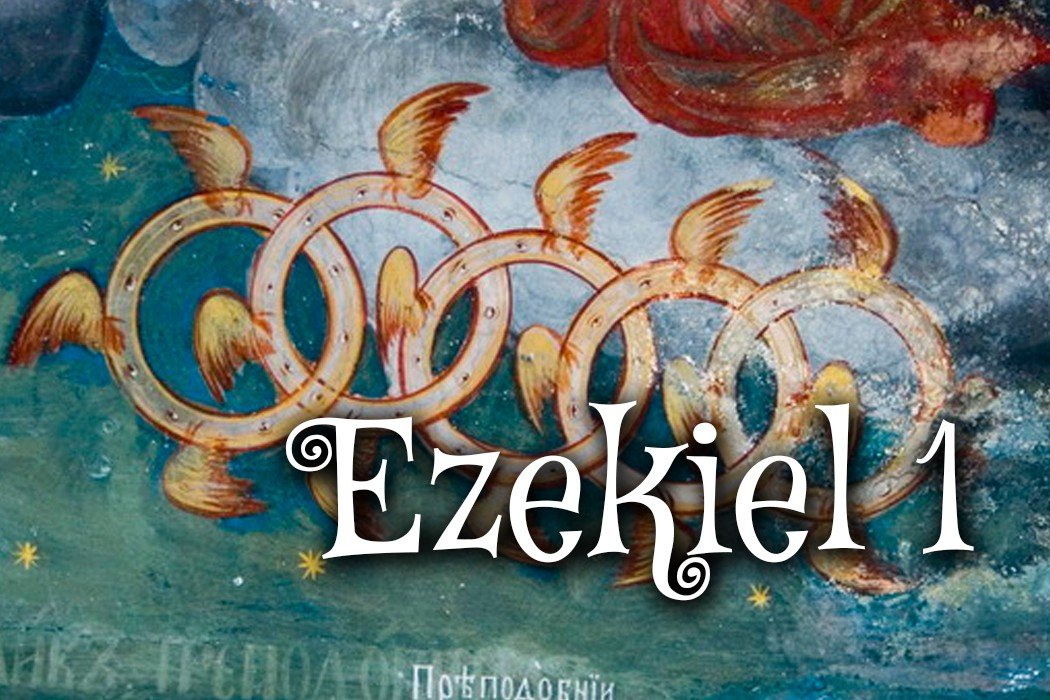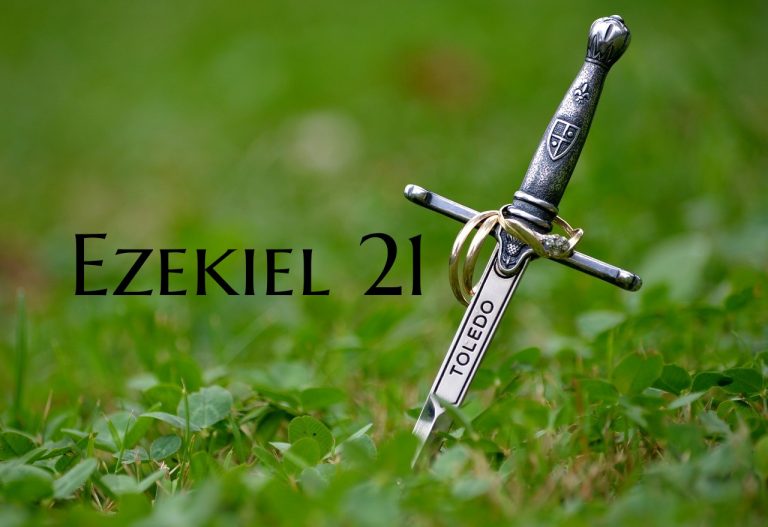Ezekiel in Babylon
1 In the thirtieth year, in the fourth month, on the fifth day of the month, as I was among the exiles by the Chebar canal, the heavens were opened, and I saw visions of God. On the fifth day of the month (it was the fifth year of the exile of King Jehoiachin), the word of the LORD came to Ezekiel the priest, the son of Buzi, in the land of the Chaldeans by the Chebar canal, and the hand of the LORD was upon him there.
The Glory of the Lord
As I looked, behold, a stormy wind came out of the north, and a great cloud, with brightness around it, and fire flashing forth continually, and in the midst of the fire, as it were gleaming metal. And from the midst of it came the likeness of four living creatures. And this was their appearance: they had a human likeness, but each had four faces, and each of them had four wings. Their legs were straight, and the soles of their feet were like the sole of a calf’s foot. And they sparkled like burnished bronze. Under their wings on their four sides they had human hands. And the four had their faces and their wings thus: their wings touched one another. Each one of them went straight forward, without turning as they went. As for the likeness of their faces, each had a human face. The four had the face of a lion on the right side, the four had the face of an ox on the left side, and the four had the face of an eagle. Such were their faces. And their wings were spread out above. Each creature had two wings, each of which touched the wing of another, while two covered their bodies. And each went straight forward. Wherever the spirit would go, they went, without turning as they went. As for the likeness of the living creatures, their appearance was like burning coals of fire, like the appearance of torches moving to and fro among the living creatures. And the fire was bright, and out of the fire went forth lightning. And the living creatures darted to and fro, like the appearance of a flash of lightning.
Now as I looked at the living creatures, I saw a wheel on the earth beside the living creatures, one for each of the four of them. As for the appearance of the wheels and their construction: their appearance was like the gleaming of beryl. And the four had the same likeness, their appearance and construction being as it were a wheel within a wheel. When they went, they went in any of their four directions without turning as they went. And their rims were tall and awesome, and the rims of all four were full of eyes all around. And when the living creatures went, the wheels went beside them; and when the living creatures rose from the earth, the wheels rose. Wherever the spirit wanted to go, they went, and the wheels rose along with them, for the spirit of the living creatures was in the wheels. When those went, these went; and when those stood, these stood; and when those rose from the earth, the wheels rose along with them, for the spirit of the living creatures was in the wheels.
Over the heads of the living creatures there was the likeness of an expanse, shining like awe-inspiring crystal, spread out above their heads. And under the expanse their wings were stretched out straight, one toward another. And each creature had two wings covering its body. And when they went, I heard the sound of their wings like the sound of many waters, like the sound of the Almighty, a sound of tumult like the sound of an army. When they stood still, they let down their wings. And there came a voice from above the expanse over their heads. When they stood still, they let down their wings.
And above the expanse over their heads there was the likeness of a throne, in appearance like sapphire; and seated above the likeness of a throne was a likeness with a human appearance. And upward from what had the appearance of his waist I saw as it were gleaming metal, like the appearance of fire enclosed all around. And downward from what had the appearance of his waist I saw as it were the appearance of fire, and there was brightness around him. Like the appearance of the bow that is in the cloud on the day of rain, so was the appearance of the brightness all around.
Such was the appearance of the likeness of the glory of the LORD. And when I saw it, I fell on my face, and I heard the voice of one speaking.
(ESV)
Ezekiel 1 Commentary
by Brad Boyles
Ezekiel was 25 years old when he was taken into captivity and was 30 when he was called into ministry. Outside of the book named after him, there is no other reference to Ezekiel in Scripture. The book contains a prophetic message as Ezekiel uses visions, parables, signs, and miraculous analogies to communicate the messages God wanted to deliver to the people in exile. Therefore, the text should be read accordingly. He was about the same age as Daniel and about 20 years younger than Jeremiah. Like Jeremiah, Ezekiel was both a prophet and a priest and his prophetic ministry and his priestly ministry both began when he turned 30.
The structure of the book is fairly chronological which is not always the case, especially in the Old Testament. You will notice as you read along that “the glory of the Lord” is a central theme for Ezekiel. In fact, he writes of it on at least 8 occasions within the entire book. Just like Isaiah and Jeremiah, Ezekiel uses a lot of symbolic language. Heis message came at a time of theological crisis.
The people going into exile have slumbered in their relationship with God and need a word that will shock them back into repentance. Enter, Ezekiel. He is arguably one of the most forceful and creative writers in Scripture with his presentation of the message that God has given to him.
Immediately in Chapter 1, we get a picture of Ezekiel’s symbolic language.
Within it there were figures resembling four living beings. And this was their appearance: they had human form. 6 Each of them had four faces and four wings. 7 Their legs were straight and their feet were like a calf’s hoof, and they gleamed like burnished bronze. 8 Under their wings on their four sides were human hands. As for the faces and wings of the four of them, 9 their wings touched one another; their faces did not turn when they moved, each went straight forward.
Ezekiel 1:5-9 NASB
We must remember that since the writing style is apocalyptic, we can read more figuratively instead of literally. The main message here is simply describing the sheer majesty and complexity of God’s angels which surround His all-seeing, all-knowing, all-powerful, and all-present nature.
“The whole conception impresses us with the reality, order, majesty, and humanness, of the Eternal God. Those holy beings surely represent the intelligent company of innumerable angels and servants, while the wheels represent the material creation. All these are sent forth to minister to the heirs of salvation. Angels and nature minister to us, if we are in union with God. All things serve the servants of the Most High.”
FB Meyer
Often we go about our day and forget about the power and mystery of God. We don’t fear Him or stand in awe of His work. We rely on our own intelligence look to material things to find our identity and satisfaction. How can anyone read this chapter and not be mesmerized by the sovereignty and authority of the One True God?




